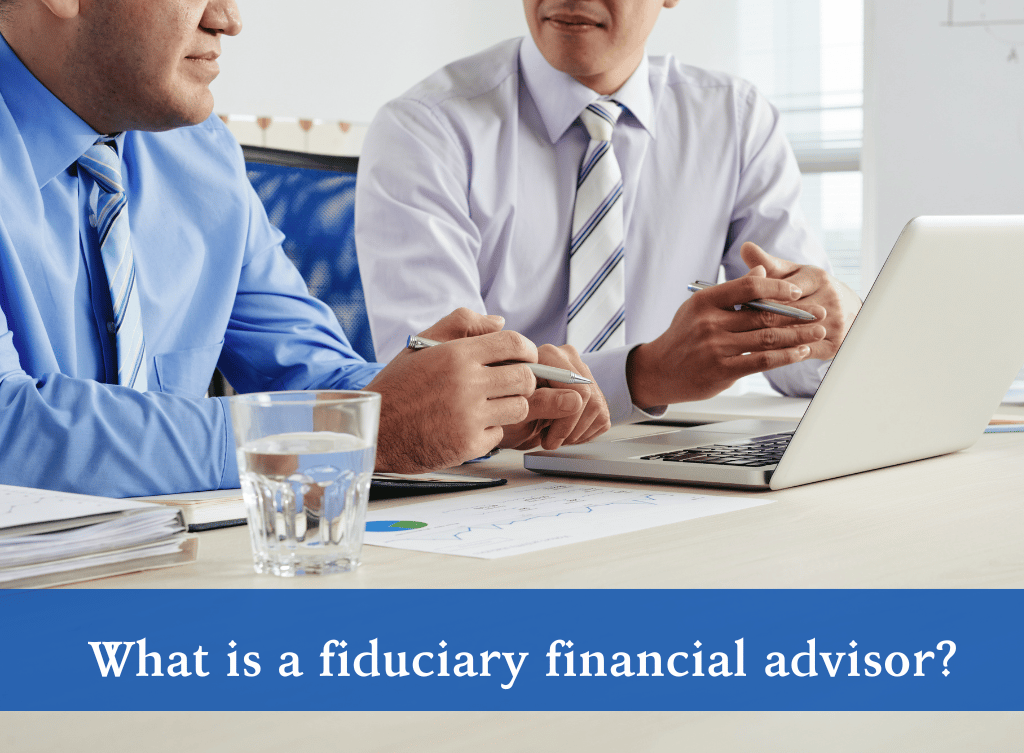Fiduciary Financial Advisor
Suppose you’ve found a wealth advisor who offers a broad range of services, has decades of experience, and presents an impressive resume filled with educational achievements.
As a high-net-worth individual, you might feel confident that such an advisor could assist you in making important financial decisions.
However, an essential question remains: Is the advisor also a fiduciary financial advisor? Understanding whether an advisor operates under a fiduciary duty is critical, especially when substantial wealth is at stake.
This guide will help clarify what it means for an advisor to be a fiduciary and why it matters when selecting the right professional to manage and protect your financial future.
Table of Contents
- Fiduciary Financial Advisor Definition
- How Is a Fiduciary Financial Advisor Paid?
- Does a CFP Have a Fiduciary Responsibility?
- What is a Fee-only Financial Advisor?
- Fiduciary Duty Versus Suitability Standard
- Fiduciary Duty vs. Suitability Standard
- 5 Common Misconceptions About Fiduciaries
- 5 Ways to Tell If Your Financial Advisor Is a Fiduciary
- A word about how fee structures can affect decision-making
- Why Working with a Fiduciary Financial Advisor Is Important
- Why Working with a Fiduciary Financial Advisor Is Important
- What is the difference between a generic advisor and a fiduciary financial advisor?
- How to choose the best fiduciary financial advisor
- What is expected of a fiduciary?
- Are All Financial Advisors Considered Fiduciaries?
- Is a Robo-advisor a Fiduciary?
- What Is Fiduciary Duty?
- What Happens If Fiduciary Duty Is Breached?
- Types of Fiduciary Relationships
- What Separates a Fiduciary Advisor From Other Planners?
The quest to find the right wealth manager involves several important considerations.
You need to evaluate the manager’s personality, the depth of their expertise, their working style, the cost of their services, how those costs are structured, and the overall level of service they provide.
Many wealth managers will discuss topics such as portfolio management, risk management, investment returns, credit management, and asset allocation.
However, an important question to ask is whether wealth managers who speak on these subjects are practicing them in ways that truly serve the best interests of their clients.
Identifying a fiduciary financial advisor — one who is legally obligated to prioritize your interests — is an important step toward ensuring that your wealth is managed with care and transparency.
You might also wonder: What is a bonded financial advisor, and how do they differ from a fiduciary or a general financial counselor?
How can you tell if your financial advisor is actually a fiduciary?
Below, we explore the answers to these questions and major strategies for choosing the right financial advisor.

Fiduciary Financial Advisor Definition
When substantial assets are involved, it is often assumed that a wealth advisor will act in the client’s best interests.
However, even with significant investable assets, there is no absolute guarantee that an advisor will always prioritize your financial well-being unless they are legally obligated to do so.
This is where choosing a fiduciary financial advisor becomes especially important.
A fiduciary advisor is legally and ethically bound to place the client’s interests above their own at all times.
Understanding the role and responsibilities of fiduciary advisors is essential for investors who seek a relationship built on transparency, trust, and accountability.
Fiduciary financial advisors are required by law to prioritize your welfare when managing your assets.
To ensure compliance with fiduciary standards, these advisors must be registered with regulatory bodies such as the U.S. Securities and Exchange Commission (SEC), the Financial Industry Regulatory Authority (FINRA), or relevant state authorities. When selecting a fiduciary advisor, it is also advisable to look for professional credentials, such as Certified Financial Planner (CFP) certification or registration as a Registered Investment Advisor (RIA).
These designations reflect a commitment to maintaining high ethical standards and delivering client-centered financial advice

How Is a Fiduciary Financial Advisor Paid?
Many fiduciary financial advisors avoid commissions or performance-based fees in order to minimize potential conflicts of interest.
In many cases, fiduciary advisors are paid solely through direct client fees, helping ensure that their advice remains client-centered.
However, it is possible for a fiduciary advisor to recommend a product that, while in the client’s best interest, carries a commission.
In such cases, fiduciary standards require the advisor to fully disclose the potential conflict of interest to the client before proceeding.
Transparency in compensation structures is a critical part of maintaining fiduciary responsibility and trust.
Does a CFP Have a Fiduciary Responsibility?
Certified Financial Planners (CFPs) are held to fiduciary standards when providing financial advice or making recommendations.
A CFP must prioritize the client’s interests at all times and take proactive steps to avoid conflicts of interest.
If a conflict cannot be avoided, the CFP must fully disclose any direct or indirect interests that could potentially impact the client’s decision-making.
Clients must also be informed if any disclosure is limited, and CFPs must obtain client consent in such cases.
In addition, a CFP is required to execute client instructions with the highest levels of care, skill, diligence, and professionalism.
What is a Fee-only Financial Advisor?
Financial advisors are generally categorized based on how they are compensated: fee-only, fee-based, or commission-based.
Fiduciary financial advisors often follow a fee-only model.
This means they receive compensation exclusively from client fees and not from commissions, bonuses, or third-party incentives.
The fee-only model significantly reduces potential conflicts of interest, as advisors are solely aligned with their clients’ financial success.
Typically, fee-only advisors charge a percentage based on the value of assets under management (AUM).
However, some advisors may charge flat fees, hourly rates, or per-service fees depending on their business model and the client’s specific needs.
Understanding an advisor’s fee structure is essential to ensure that the compensation model supports unbiased financial advice.

Fiduciary Duty Versus Suitability Standard
The fiduciary standard requires financial advisors to act in the best interests of their clients at all times, prioritizing client needs above their own or any affiliated firm.
In contrast, the suitability standard — often applied to non-fiduciary advisors — only requires that a recommended product or service be “suitable” for the client’s general financial situation.
A suitable recommendation may meet a client’s needs, but it may not necessarily be the best available option or the most cost-effective choice.
Recognizing the difference between fiduciary and suitability standards can help investors select advisors who are more closely aligned with their long-term financial goals.
Fiduciary Duty vs. Suitability Standard
Having a fiduciary duty means that a financial advisor must always act in the best interests of their client.
This obligation requires a deep understanding of the client’s financial situation, goals, and needs, and it prohibits the advisor from recommending products that serve their own interests at the client’s expense.
In contrast, the suitability standard — typically applied to broker-dealers — requires only that the advisor or broker have a reasonable belief that an investment or transaction is suitable for the client’s general financial circumstances.
Under this standard, a broker-dealer may recommend a product that benefits them financially, even if a better or lower-cost alternative exists, as long as the recommendation is considered “suitable.”
Registered Investment Advisors (RIAs) are legally bound by fiduciary duty, while broker-dealers and individuals involved in buying and selling securities generally are not, unless specifically required by state regulations.
The key distinction is that fiduciary advisors must recommend only those investments that truly serve the client’s best interests, rather than merely offering products that meet a minimum suitability threshold.
5 Common Misconceptions About Fiduciaries

1. Anyone Can Be a Fiduciary
While the term “fiduciary” suggests a high level of trust and responsibility, not everyone operating in the financial industry is bound by fiduciary duty.
The Securities and Exchange Commission (SEC) holds certain advisors to standards known as the suitability standard, which only requires that recommendations be suitable for the client — not necessarily the best available option.
Certified Financial Planners (CFPs) are required to act in the client’s best interests, offering the most appropriate solutions available, but this expectation does not automatically extend to all advisors.
For other fiduciary roles, such as attorneys or guardians, obligations are clearly defined by law and professional codes of conduct.
2. There Is Always a Test or License
Fiduciaries do not necessarily have to pass a specific test or obtain a separate license to hold that responsibility.
A fiduciary is simply someone who is entrusted to act in the best interests of another party, typically based on professional qualifications, experience, and a commitment to ethical standards expected in their field.
Nonetheless, many fiduciary financial advisors hold professional certifications, such as the CFP designation, that reinforce their adherence to fiduciary principles.
3. Fiduciary Law Is Easy to Enforce
While fiduciary financial advisors are legally required to avoid misleading clients, hiding fees, or prioritizing their own interests, enforcing fiduciary breaches can be complex.
Clients who suspect misconduct may initiate legal action, but proving unethical behavior often requires substantial evidence.
Additionally, even a diligent fiduciary cannot control external market forces, meaning that losses or underperformance do not automatically indicate a breach of fiduciary duty.
4. Being a Fiduciary Is Like a Guarantee
It is important to understand that fiduciary status does not guarantee investment success.
Financial markets involve inherent risk, and even the most carefully crafted investment strategies may experience volatility or losses.
Fiduciaries are committed to acting with loyalty and diligence, but they cannot eliminate market risks or assure specific financial outcomes.
5. Fiduciaries Cannot Be Dishonest
Although fiduciary standards require ethical behavior, fiduciaries are not immune to human error or misconduct.
In rare cases, individuals who are fiduciaries may act dishonestly, as history has demonstrated in some well-known financial scandals.
For this reason, it is wise to perform due diligence before engaging any financial advisor, reviewing regulatory records and client histories to confirm a clean and professional track record.
5 Ways to Tell If Your Financial Advisor Is a Fiduciary

Whether or not your advisor is a fiduciary can significantly impact the success of your financial plan.
Here are five ways to determine if your advisor truly operates under a fiduciary standard.
Ask Them Directly
Sometimes the simplest approach is the best.
Ask your advisor directly if they adhere to a fiduciary standard and request examples of how they act in their clients’ best interests.
A fiduciary advisor should be able to clearly explain the steps they take to avoid conflicts of interest, such as disclosing any potential conflicts or suggesting investment alternatives that do not benefit them financially.
This level of transparency builds trust and demonstrates a commitment to fiduciary principles.
Review the Advisor’s Credentials
Certain professional designations indicate a fiduciary obligation.
For instance, Certified Financial Planners (CFPs) are required to act as fiduciaries when offering financial advice, meaning they must prioritize the client’s financial goals above their own or their firm’s interests.
Credentials like CFP or registration as a Registered Investment Advisor (RIA) are strong indicators that an advisor is committed to operating under fiduciary standards.
Examine Their Fee Structure
Understanding how an advisor is compensated can reveal much about potential conflicts of interest.
Fiduciary advisors typically operate on a fee-only basis, meaning they are paid directly by their clients rather than earning commissions from third parties.
A transparent fee structure, presented clearly and without hidden charges, helps ensure the advice you receive is unbiased and solely focused on your best interests.
Fee-only advisors avoid the conflicts that can arise when compensation is tied to selling specific financial products, helping build a stronger, more trustworthy relationship over the long term.
Research Their Registration
Advisors who register with the U.S. Securities and Exchange Commission (SEC) as Registered Investment Advisors (RIAs) are legally obligated to follow a fiduciary standard.
This registration commits them to place clients’ interests ahead of their own or their firm’s financial gain.
It’s important to recognize that not all financial advisors operate under this high standard.
For example, brokers overseen by the Financial Industry Regulatory Authority (FINRA) are typically required only to meet a suitability standard, which does not require that recommendations be the best possible option for the client.
Understanding an advisor’s regulatory obligations helps you assess whether they are truly committed to acting in your best interests.
Request a Written Commitment
A fiduciary advisor should be willing to provide a written statement affirming their fiduciary responsibility.
This document serves as a formal agreement, clearly stating that the advisor is legally and ethically bound to act in your best interest at all times.
Obtaining a written fiduciary commitment can offer an additional layer of protection and reinforce the trust between you and your advisor.
A word about how fee structures can affect decision-making
The wealth management field typically operates under two general compensation models: fee-based and fee-only.
Under the fee-based model, a wealth manager may earn compensation through a combination of client fees and commissions.
Fees might be charged on an hourly basis, where clients pay for the number of hours worked, or through milestone payments, where a pre-agreed amount is paid upon reaching specific deliverables.
In addition to these fees, advisors operating under a fee-based model may receive commissions from financial product providers.
This occurs when clients purchase specific investment products, such as mutual funds or insurance policies, that carry embedded commissions.
While the recommended products may be suitable, the commission structure can create an incentive for advisors to promote certain options, even when other alternatives might better serve the client’s needs.
By contrast, the fee-only model eliminates commissions altogether.
A fee-only advisor is compensated solely through client-paid fees, whether charged hourly, tied to milestones, or based on a percentage of assets under management.
This structure reduces conflicts of interest and helps ensure that the advice provided is focused entirely on the client’s best interests. Without the distraction of commissions, fee-only advisors are incentivized to build long-term client relationships based on trust, satisfaction, and successful outcomes.
Many fiduciary wealth managers operate under a fee-only model to align their services more closely with client needs and expectations.
Why Working with a Fiduciary Financial Advisor Is Important

Having a fiduciary duty means having to work in the best interests of the other party (client in this case of financial advisory relationship).
The fiduciary advisor must be free of any conflict of interest, that is, not taking part in commissions or bonuses he might get from selling such and such a product. He has to recommend the best products on the market that will serve the client.
The fiduciary advisor has to disclose fully any conflicts of interest to ensure the best decision is made for the client. The advisor must act with skill and care and always adhere to the wishes of the client in the work conducted on their behalf.
On the flip side, the non-fiduciary advisor is only supposed to recommend to the client the products the customer needs, but not that they are necessarily the best in the market.
Why Working with a Fiduciary Financial Advisor Is Important
In a financial advisory relationship, having a fiduciary duty means that the advisor is legally and ethically obligated to act in the best interests of the client at all times.
This duty requires the advisor to prioritize the client’s needs above any personal gain or external incentive.
A fiduciary financial advisor must be free from conflicts of interest.
They cannot recommend products based on commissions, bonuses, or any other form of compensation that could influence their advice.
Instead, they are expected to recommend the best available products and strategies solely to benefit the client’s financial goals.
Full disclosure is also a critical part of fiduciary responsibility.
If any potential conflict of interest exists, the fiduciary advisor must inform the client clearly and transparently, allowing the client to make fully informed decisions.
Additionally, fiduciary advisors must act with the highest levels of skill, care, and diligence, and they must consistently honor the client’s wishes and instructions when managing financial matters on their behalf.
Choosing to work with a fiduciary financial advisor helps ensure that your financial planning, investment management, and wealth preservation strategies are built on trust, transparency, and a commitment to your success.
What is the difference between a generic advisor and a fiduciary financial advisor?

A financial advisor is generally someone who provides guidance on a variety of financial matters, such as investment management, retirement planning, tax strategies, risk management, and estate planning.
However, not all financial advisors operate under the same ethical or legal standards.
A fiduciary financial advisor is a specific type of advisor who is legally obligated to act solely in the best interests of their clients.
This fiduciary responsibility means they must avoid conflicts of interest, disclose any potential conflicts, and prioritize the client’s goals over any financial incentives or commissions.
By contrast, a non-fiduciary advisor may recommend financial products that are considered “suitable” but may also serve to generate higher commissions or benefits for themselves.
While the advice they offer might meet a client’s general needs, it might not always be the best or most cost-effective option.
When considering your options, it is also helpful to decide whether you prefer to work with a human financial advisor or a robo-advisor.
Whichever path you choose, ensuring that the advisor is fully transparent about compensation structures and potential conflicts of interest is essential to protecting your financial future.
For example, when choosing between a low-cost passive investment fund and a higher-cost actively managed fund, a fiduciary advisor would objectively evaluate which choice better aligns with your financial goals, without being influenced by potential commissions.
Their guidance would center solely on your success, offering full visibility into how every decision supports your broader plan.
Fiduciary advisors also tend to highlight various factors that might impact even seemingly straightforward decisions, helping clients consider the broader financial implications and achieve more informed outcomes.
How to choose the best fiduciary financial advisor
Once you recognize the importance of working with a registered fiduciary financial advisor, the next step is finding the right one.
But what happens if you find several advisors who meet the basic fiduciary requirements?
Choosing the best fiduciary financial advisor is crucial because you are entrusting them with your hard-earned wealth, and the stakes can be worth millions.
One important factor to consider is the advisor’s reputation.
Has the advisor successfully worked with high-net-worth or ultra-high-net-worth portfolios?
Managing a $50 million portfolio requires a different level of skill and sophistication compared to managing $1 million.
Look for an advisor who understands your unique financial profile.
Review the advisor’s track record, client testimonials, and overall reputation for further insights.
The number of years the advisor has been practicing can also serve as a valuable indicator of consistency and experience.
Another effective approach is to seek referrals from people you trust.
Family members, friends, colleagues, business partners, or others within your professional network who share your financial profile may already work with fiduciary advisors and can provide candid recommendations based on their experiences.
Additionally, advisors who are registered board members or Certified Financial Planners (CFPs) are typically required to meet fiduciary standards.
Professionals such as financial advisors, investment managers, accountants, and corporate officers often operate under fiduciary obligations, managing assets with the client’s best interests as their primary responsibility.Most importantly, before beginning your search, clearly define what you want from a fiduciary advisor.
Understanding your own financial goals and expectations will help you identify an advisor who can align their strategies with your vision for the future.
What is expected of a fiduciary?
A fiduciary advisor is required to act solely in the best interest of their client.
They must disclose any conflicts of interest and explain how such conflicts are managed.
Clients can expect fiduciary advisors to act in good faith, providing transparent information about the advice they offer, the investment strategies they recommend, and the fees they charge for their services.
Transparency, loyalty, and diligence are the cornerstones of a fiduciary relationship, helping clients make informed financial decisions with confidence.
Are All Financial Advisors Considered Fiduciaries?
Not all financial advisors are considered fiduciaries.
While fiduciary advisors have a duty of care, loyalty, confidentiality, and prudence toward their clients, other types of financial planners may not be held to the same standards.
A fiduciary advisor is obligated to prioritize what matters most to the client and to consistently act in their best interests.
Other financial professionals, however, may only be required to recommend suitable—but not necessarily optimal—financial products or strategies.
Understanding the difference between fiduciary and non-fiduciary advisors is essential when choosing the right financial professional.
.
Is a Robo-advisor a Fiduciary?

Some robo-advisors are registered with the U.S. Securities and Exchange Commission (SEC) and may be considered fiduciaries in a legal sense.
However, because robo-advisors operate solely through automated algorithms without human judgment, they are limited in their ability to understand the full context of an investor’s unique financial situation.
While they can offer low-cost, standardized investment solutions, robo-advisors do not possess the personalized insight and discretion that a human fiduciary advisor can provide.
What Is Fiduciary Duty?
Fiduciary duty refers to a legal and ethical obligation to act in a manner that benefits another party, typically financially.
The person who holds the fiduciary duty is known as the fiduciary, while the person to whom the duty is owed is referred to as the principal or beneficiary.The two primary responsibilities of a fiduciary are the duty of care and the duty of loyalty.
The duty of care requires the fiduciary to exercise sound judgment, conduct thorough analysis, and act prudently when making decisions on behalf of the beneficiary.
The duty of loyalty demands that the fiduciary always place the beneficiary’s interests above their own, ensuring that all actions and recommendations are made with the beneficiary’s best interests in mind.
What Happens If Fiduciary Duty Is Breached?
If your advisor is a fiduciary and you believe they have violated their duty, even on a moral level, it is advisable to terminate the relationship immediately.
A breach may occur if an advisor makes false statements regarding stock trades, executes trades without your permission, or personally benefits from the recommendations they provide.
If you experience a monetary loss as a result of the breach, you have the right to file a civil claim to seek recovery of your losses.
Should your complaint be validated, you may receive compensation, and the advisor could face disciplinary action, including fines, suspension, or even disbarment from professional practice.
Protecting your financial interests means remaining vigilant and taking appropriate action if fiduciary duties are not honored.
Types of Fiduciary Relationships
Fiduciary responsibilities are not limited to financial advisors; they arise in several different contexts where trust and responsibility are critical.
Guardians undertake legal obligations to act in the best interests of their wards, typically minors or individuals unable to make independent decisions.
Because of the vulnerability of those they serve, guardians are held to a fiduciary standard to ensure proper protection and care.
Corporate board members also act as fiduciaries.
They manage the corporation on behalf of its shareholders — the true owners of the company — and are expected to handle corporate affairs and investments with prudence, loyalty, and transparency.
Lawyers have fiduciary duties as well, focused on zealously protecting and defending their clients’ interests.
Their responsibilities include maintaining confidentiality, acting with loyalty, and consistently working to secure the best possible outcomes for those they represent.
Understanding the various types of fiduciary relationships highlights the critical role that trust, care, and loyalty play across many aspects of professional and financial services.
What Separates a Fiduciary Advisor From Other Planners?
A fiduciary advisor always follows the best course of action in the interests of the client.
They uphold a duty of care, loyalty, confidentiality, and prudence, ensuring that every recommendation and decision focuses entirely on what matters most to the client.
This level of dedication is not guaranteed with all financial planners, as many operate under standards that allow for potential conflicts of interest.
Working with a fiduciary advisor offers a unique advantage: you gain the assurance that your financial strategies are designed solely around your personal goals, without the influence of commissions, sales targets, or third-party incentives.
Fiduciary advisors not only help manage wealth with care and transparency but also take a holistic approach to safeguarding your financial future through customized planning, risk mitigation, and proactive investment management.
Choosing the right fiduciary advisor can be a critical step toward achieving financial clarity, stability, and growth, especially for individuals and families managing substantial assets.
Ready to Connect With the Right Financial Advisor?
Find the guidance that puts your best interests first.
